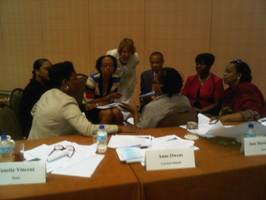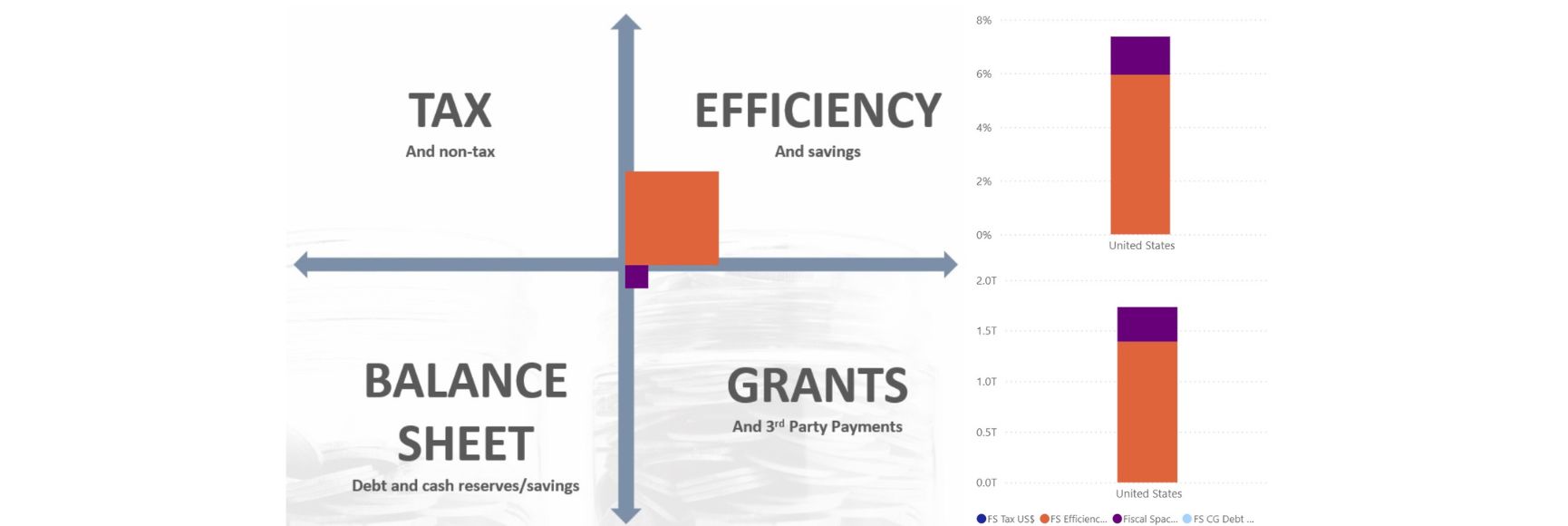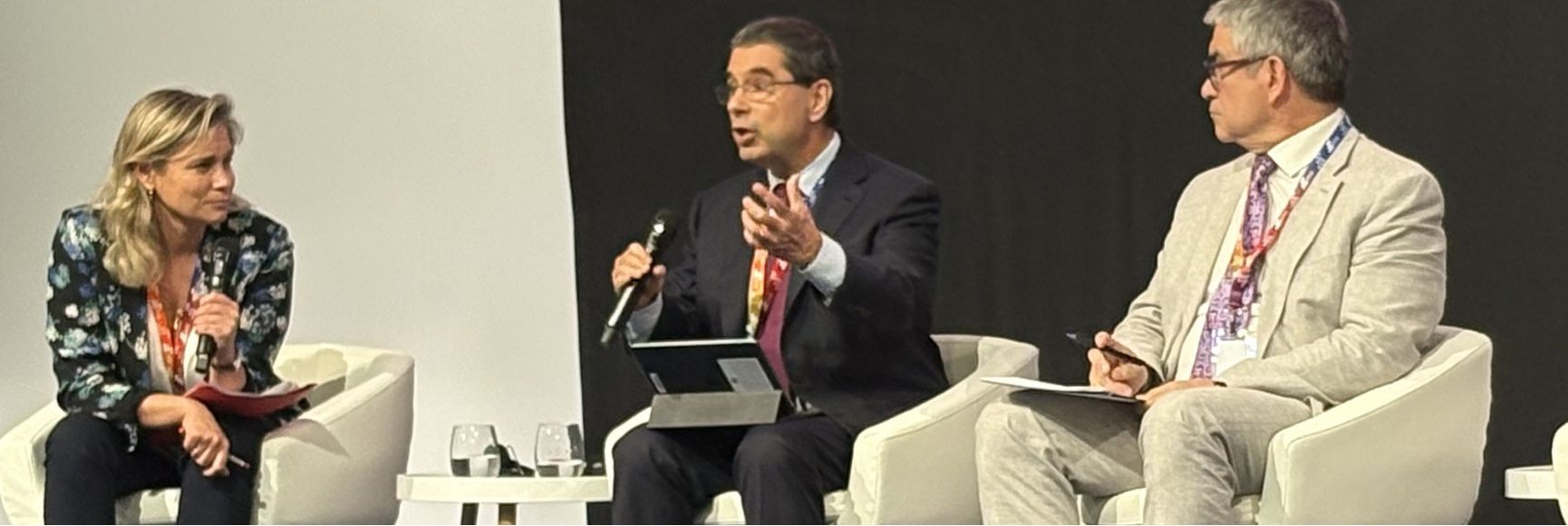Posted by Eileen Brown andMatthew Smith

Senior finance officials fromseveral CARTAC countries participated in a lively CARTAC workshop in Trinidad fromFebruary 25-27 with international experts Richard Allen and David Shand. Theworkshop discussed how to best structure finance ministries to meet demands tosustain economic growth; how to design their PFM reform strategies and get themost from technical assistance; and how to manage the fiscal risks of state-ownedenterprises (SOEs). The countries represented were Antigua, British VirginIslands, Cayman Islands, Dominica, Haiti, Jamaica, Nevis, St Lucia, St Vincentand Suriname. There were 22 participants as well as the two presenters and twofacilitators.
“This workshopreally worked for me,” said Devon Rowe, Jamaica’s Financial Secretary (FS) “becauseit verified some options I was considering and it opened me up to new ideasbased on what worked for my Caribbean colleagues. Mostly it persuaded me that we all benefitwhen we share experiences. There are mistakes that we will not have to repeatbecause Dominica, St. Lucia, Antigua and BVI have shared their missteps as wellas their successes with us.”
“Dominicaalways learns something and I am gratified we were able to share so much ofwhat we learned with others” said FS Rosamund Edwards.
“I couldwrite a book of do’s and do not’s in reform,” said Deputy FS John Edwards. “I like the structure of this workshop –experts tell us about new thinking and world experience, and then respondconstructively when we tell them what obtains in the region.” Antigua and Barbuda had enjoyed a wealth oftechnical assistance funding and worked hard to properly sequence it.
Day 1 – The Organization andManagement of Modern Ministries of Finance
Can theorganizational structure of an MoF contribute to the effectiveness of PFMreforms? Richard Allen presented various models, compared them, and pointed outbenefits and challenges. The main pointswere as follows:
- Ministriesof finance in advanced countries spend substantially less resources thandeveloping countries on transactional functions (such as processing paymentorders, and managing cash) and increasingly more on policy-related functionssuch as fiscal analysis, budget strategy and tax policy. Over time, transactionalfunctions are out-sourced to line ministries or semi-autonomous agencies, orsometimes transferred to the private sector. This transformation is partly linkedto the computerization of operational tasks such as payment processing andinternal control. Finance ministries also need to have confidence that spendingagencies will execute the budget efficiently without jeopardizing the safetyand control of public money. However, for developing countries such atransformation is likely to take many years. In the meantime, financeministries in the region can begin the gradual process of building up theircapability in key policy areas such as macroeconomic and fiscal forecasting andanalysis.
- Thesize of an MoF is less important than that it has strong leadership and conductsits functions efficiently and effectively. Some of the most efficient MoFs inthe world have only a few hundred staff. In some of the very small countries ofthe Caribbean an even smaller number of staff would be appropriate.
- ModernMoFs have relatively flat organizational structures, together with strongvertical and horizontal lines of communication within the organization, and aneffective network of communications with external stakeholders such as theoffices of the president and prime minister, line ministries, parliament andcitizens’ groups. Some of these important connections have yet to be fullydeveloped in the region.
- Effortsto reform MoFs in advanced countries have been led from the top but need toinvolve all levels of staff. Reform is always controversial, and often painfulto certain groups of employees who find that their jobs are eliminated orchanged. The leadership needs to handle such situations with care andsensitivity. Finance ministries that have gone through extensive organizationalreform have invested heavily in counseling staff who are adversely affected, andin managing the reform process through all its stages.
Jamaica’sFS Devon Rowe presented his vision for a remodeled MoF in Jamaica that wouldpromote faster and more effective decision-making based on delegatedresponsibility and authority within an accountability framework.
Localofficials noted that reform efforts are limited by the time required carry outthe basic functions of government: time is only available for reform ‘aftertheir real jobs are done.’ Theycounseled that a dedicated team is needed to manage any reform process becauseattention to mundane but operationally critical issues will always trump effortsto create a better future – “there really is no choice to getting the debtpayments out” one official illustrated.
Day 2 – The Design of PFM ReformStrategies and Getting the Most from TA
Richard Allenpresented a series of frequently-observed problems and pitfalls with traditionalforms of PFM reform strategy and TA provision:
- Entrenched,inflexible ways about thinking about and doing PFM reform are common, andgenerally unhelpful to the reform process.
- The‘cargo cult’ idea of transposing reforms from advanced countries to developingones has achieved much popularity with reformers, but needs to be treated withgreat caution.
- ‘Bestpractice’ solutions do not generally provide a sound basis for reform indeveloping countries.
- StartingPFM reform early doesn’t guarantee success.
- Reformis often initiated as a ‘signal’ to attract international recognition and thesupport of donors. This partly explains why reform efforts are often notsustained and their impact is poor.
- Reformsthat are internalized and ‘embedded’ in local officials are much more likely tobe successful.
- Donorsgenerally pay insufficient attention to the vitally important institutional andpolitical aspects of the reform process: reform is not primarily a technicalissue.
- Focusingreform on ‘formal’ elements such as laws and regulations is useful but onlydeals with part of the problem, and not normally the most important part.
- Focusingreform only on a narrow range of counterparts – generally technocrats in theMoF – often leads to poor results because little effort is made to consult officialsin other agencies who are heavily involved in the budget process and otherfinancial policies. As a result, line ministries often resist attempts by theMoF to implement reforms such as a new FMIS or a TSA.
- Existingmodalities of delivering TA need to be rethought. Shipping in internationalexperts with little local knowledge for short periods of time generally addslittle value. More regular and sustained support, as provided by CARTAC forexample, brings better results.
- Startingwith locally perceived problems rather than externally imposed solutions islikely to provide a stronger basis for sustained PFM reform.
Richardpresented several models of PFM reform strategy, as well as the benefits andlimitations of each. These models include Allen Schick’s “back to basics”, the“platform approach”, the “modified platform approach” (applied for example, tothe gradual development of an MTEF, through three stages), and theproblem-driven, iterative and adaptive (PDIA) approach developed by MattAndrews in a forthcoming book. PDIA involves a large element of “muddlingthrough” or trial and error in the reform process, replicating how reform hashistorically taken place on a slow, step-by-step basis in now-advancedcountries. It offers perhaps the most promising route to successful reform indeveloping countries, but requires a substantial change in the attitude andbehavior of development partners. Donors tend to have an entrenched notion ofwhat is right for a country (focusing on solutions rather than problems),together with a bias toward projects that include large disbursements offinancial resources and TA.
Participantsin the workshop conducted spirited debates about reform strategies that workand those that are less effective. Some complaints were universal, including atrio of braided opinions about development partner funding: gratitude; impotence and being overwhelmed. “We could not do much reform at all withoutthe support of donors”, said one thoughtful local official, “but they offersolutions before [or despite] our definitions of our most pressing problems.”
Onecountry related an example that was shared by others: they had been therecipient of numerous diagnostic studies by various bilateral and multilateraldevelopment partners. They found theprescriptions dauntingly complex yet without a simple action plan they couldfollow. The country had asked forimmediate, specific help to implement a direct mandate of the premier –instead, they received another diagnostic mission. One country official intoned, ‘”I just wish wecould say – no thank you, we knowwhat we need. Why can’t you give us money for that, not what you wantto do?”
In orderto say ‘no’ to any specific donor proposal, the group concluded that thefinance ministry must display strong leadership, and develop their ownsequenced PFM reform strategy with prioritized timelines. They would then bewell placed to explain to a development partner why a particular proposal doesnot fit with the government’s strategy, or can be postponed until a later time,and what form of assistance would be really helpful instead. “A real bonus,” said one participant, “isthat this approach makes it less of a diplomatic feat to try to contain theoverlapping and ‘competing’ activities of several donors.”
Thegroup focused on how to develop a PFM strategy that can actually be implementedrather than one that simply looks good on paper. Such a strategy needs to be easilyunderstood and accepted by the various parts of the government. “A 40-pageaction plan is really not much use to us,” said one exasperated localofficial. “We need a strategy that manypeople understand when they are facing daily choices – something that tellsthem a change is on the priority list or they should be prepared to wait.’
The groupsuggested that key elements of a practical reform strategy should comprise:identifying problems that need to be solved, in priority order; and involving awidely-defined stakeholder group to brainstorm on the problems that arise indifferent parts of government and discuss potential solutions. “Settingpriorities is key” said one country’s reform leader. An effort to reach out andlisten to stakeholders is critically important, local officials concluded, andleads to best fit solutions. Such approaches, however, are not popular withdonors because they are time consuming, do not require substantialdisbursements of cash (at least in the early stages), and are outside the‘comfort zone’ of donors. The singlelargest problem, countries agreed, was the ‘travelling salesmen’ whosuccessfully pitched ‘solutions’ unmatched to the countries problems,priorities, practices and resources.
Participantsalso stressed that a successful reform strategy needs to figure out how to getpeople to do things differently. “Peoplealways find numerous rationales for finding ways to resist change: it is humannature.” BVI’s Patlian Johnson summed up the general mood by noting that“Tradition is simply the way we are currently doing things – and if it is notgiving us the results we want, then we need to find a better way.”
Day 3 – State Enterprises – Managingthe Risk and Getting the Benefits
DavidShand noted that the term SOE couldapply to all statutory bodies as well as only to those operating in a marketand that this appeared to be the Caribbean terminology. Although his presentations focused mainly onthe latter he noted that both have similar issues of performance andaccountability.
David spokeof the importance of the government acting as an active owner of SOEs anddeveloping sound arrangements for their monitoring and accountability. He notedthat whereas some countries derive considerable budget revenue from their SOEs,in other countries SOEs area significant drain on the budget, as well as asource of ongoing fiscal risk through government guarantees of their debt. Hestressed that the key factor in managing this fiscal risk is improving thefinancial performance of SOEs.
Participantsidentified their own examples of the budgetary costs of poor SOE performance.
Davidthen discussed common institutional and substantive issues in poor SOEperformance and noted good practices for SOE’s corporate governance developedby OECD and others. He discussed how a performance regime might be developedfor SOEs – based on assigned levels of autonomy, reliable and timely financialreporting using international accounting standards, setting of clear financialand operating objectives and targets and strong monitoring of performance– by SOEsthemselves, by sector ministries and by the MOF. Identification of SOEquasi-fiscal activities was also discussed along with arrangements formonitoring SOE debt.
The NewZealand State Owned Enterprises Act which requires SOEs to operate assuccessful businesses and provides substantial operating autonomy with strongmonitoring by a special unit located in the MOF and independent directors waspresented as a model at one end of the possible spectrum of arrangements. Participants were invited to consider to whatextent such a “commercial” approach could be implemented in their country.
Theimportance of well qualified boards and senior management was also stressed asan important factor in SOE performance. The need for active monitoring offiscal risk arising from SOEs including possible statements of fiscal risk aspart of budget documentation was also emphasized.
Theissues discussed by participants included; developing a useful e-classificationof the various types of SOE and treating the enterprises within each category ina consistent manner rather than with different provisions in separate laws; developingperformance targets; letting enterprises run themselves and then holding themto their targets; and integrating the financial management of SOEs into thegovernment’s overall PFM strategy.
The roleof SOE boards and board members was discussed at length. David explained the reasoning behind emerginggood practice that boards should comprise independent directors chosen fortheir professional skills and not include government officials. Some participants emphasized the importanceof having MoF and sector ministry officials on the boards so that the governmenthas ready access to information on SOE operations. Small countries also tend tohave a limited pool of talent for independent directors. In response David stressedthe importance of MoF having receiving good information on SOE performancethrough other mechanisms, with a strong MoF being key to managing fiscal risk,monitoring performance against targets, reviewing financial statements andgetting regular briefings from the SOE. In many countries, it was useful to setup an SOE monitoring unit in the MoF.
It wasnoted that Antigua and St Lucia have an SOE monitoring unit, although thelatter appears to lack teeth, and that Jamaica is currently setting oneup.
CARTAC participantsleft the workshop focused on how they could better integrate the benefits andrisks of their state enterprises into the overall fiscal management of their countries.
Links to all the workshop presentations can be found at www.cartac.org
Note: The posts on the IMF PFM Blog should not be reported as representing the views of the IMF. The views expressed are those of the authors and do not necessarily represent those of the IMF or IMF policy.





